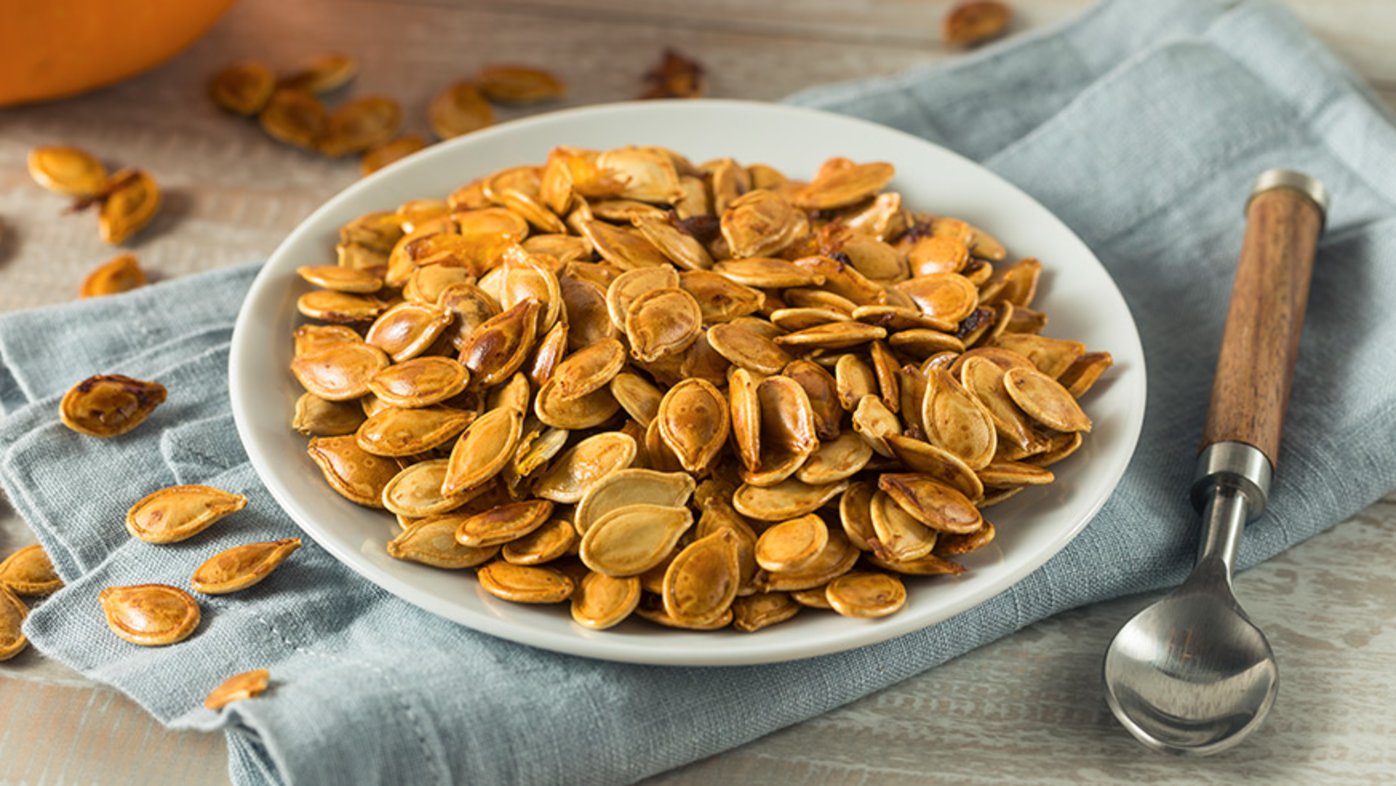
Health benefits of pumpkin seeds
Pumpkin seeds are loaded with the nutrients our bodies need.
This is part two of "Undiagnosed and dying;" read part one on Sharp Health News.
For three days, Dr. Maia Uli remained at Sharp Memorial Hospital connected to a lifesaving heart-lung bypass machine after two cardiac arrests.
When doctors felt the 34-year-old's heart was strong enough to beat on its own, they removed the ECMO. Dr. Uli slowly regained consciousness, though she was unable to speak because she was still intubated.
When doctors finally removed the tube, Dr. Uli asked two questions: "What hospital am I in?" and "Is someone covering my surgeries?"
"I was concerned about my patients," recalls the Sharp Rees-Stealy Medical Group
OBGYN, who delivers babies and performs procedures at Sharp Mary Birch Hospital for Women & Newborns. "I had no idea how long I'd been away."
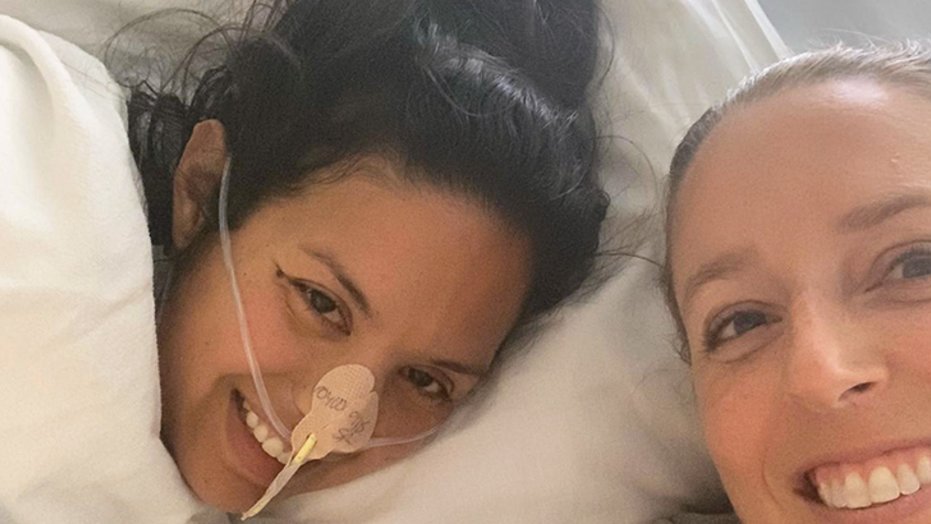
Sharp Rees-Stealy OBGYN Dr. Blair Henderson (right) visited her colleague, Dr. Maia Uli, in the intensive care unit at Sharp Memorial Hospital.
'We had no idea what was going on.'
Dr. Uli's medical team had still not determined what was making their colleague so sick. Though the ECMO machine had saved her life, her dangerous symptoms had not stopped.
Only hours after removing the tube down her airway, Dr. Uli had to be intubated a second time. Her heart rate became erratic and a blood test showed she was hypoxic, meaning her body could not retain enough oxygen.
She spent three more frightening days on the ventilator, unable to speak, feeling like she was suffocating. All the while, her medical team tested diagnosis after diagnosis that seemed to match her symptoms.
"We had no idea what was going on," said Dr. Ashraf Rashid, Dr. Uli's pulmonologist at Sharp Memorial. "Here's this young patient. She's active, takes care of herself, doesn't smoke — there was nothing strange about her history to present with such an extreme condition."
Doctors ordered several tests to look more closely at Dr. Uli's heart vessels and structure. They took a biopsy to see if a virus had attacked her heart muscle.
Everything came back negative.
When doctors tried removing the second breathing tube, Dr. Uli's heart went back to beating irregularly and she became hypoxic again. The ventilator went back on for a third time.
"Everyone was discouraged, and no more so than the doctors caring for her," says Dr. Uli's husband, Jess Bradshaw. "It was trial and error — a frustrating trial and error — but they were figuring out a puzzle."
Blood test offers a clue
Finally, there was a breakthrough: Ten days into her hospital stay, results came back from a specialized blood test that takes several days to complete.
The test showed an elevated level of metanephrines in Dr. Uli's blood. Metanephrines are made when the body breaks down hormones made by the adrenal glands, which sit on top of each kidney. Adrenal glands release crucial hormones that, among other things, affect how the body responds to stress. A high level of metanephrines in the blood indicates something is not working right with the glands.
Doctors sent another sample of Dr. Uli's blood back to the lab to rule out a false-positive, but felt they couldn't wait another week to get the results. They ordered a computed tomography (CT) scan of Dr. Uli's abdomen, which clearly showed a grape-sized mass on the inner part of the gland.
The tumor — called a pheochromocytoma, or "pheo" for short — is incredibly rare. The condition is diagnosed in about 2 out of every 1 million people each year. Dr. Uli recalls seeing "a few slides" about the illness during the entirety of medical school.
"We were all baffled by it," says Dr. Rashid. "For most of us, it was the first time we'd ever seen this condition. It definitely was the first for me. We all read about pheos in school, but it's just one of those weird syndromes you never see, especially in someone so young and healthy."
In retrospect, Dr. Uli's symptoms completely align with a pheochromocytoma. The tumor releases adrenaline in uncontrolled bursts, triggering a fight-or-flight response in the body. The result: irregular heart rate, blood pressure swings, weakness, light-headedness and headaches. Untreated, the tumor can cause serious health problems including stroke, heart attack and even death.
Recovery, with a grateful heart
Sixteen days after she ordered medics to take her to Sharp Memorial, Dr. Uli underwent surgery to remove the pheochromocytoma. She spent six more days in the hospital before heading home, her symptoms completely gone.
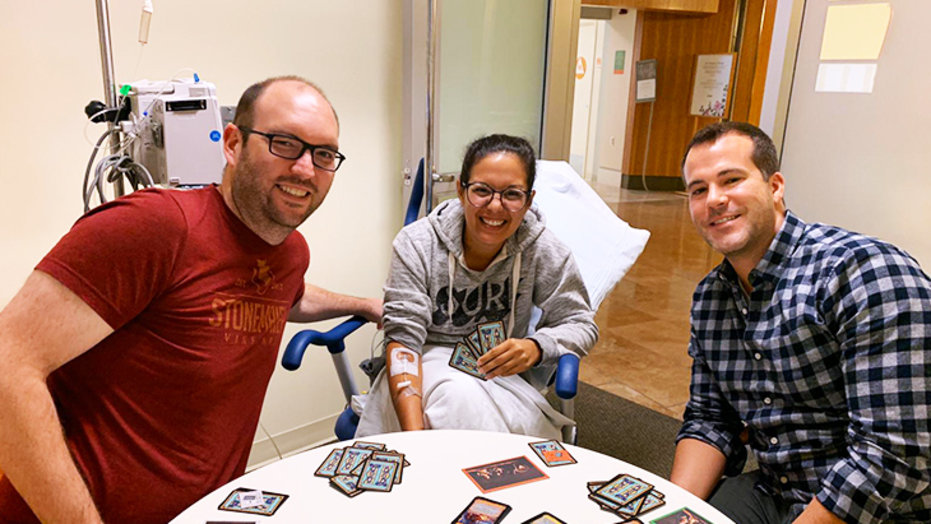
Dr. Maia Uli joins her husband, Jess Bradshaw (right), and a friend for game night in the hospital following her surgery.
Recovery was slow, though steady. Her damaged heart was regaining strength, but Dr. Uli was initially weak and relied on her husband to help her walk, bathe and dress. She began outpatient rehabilitation therapy and within a few months felt mostly back to normal.
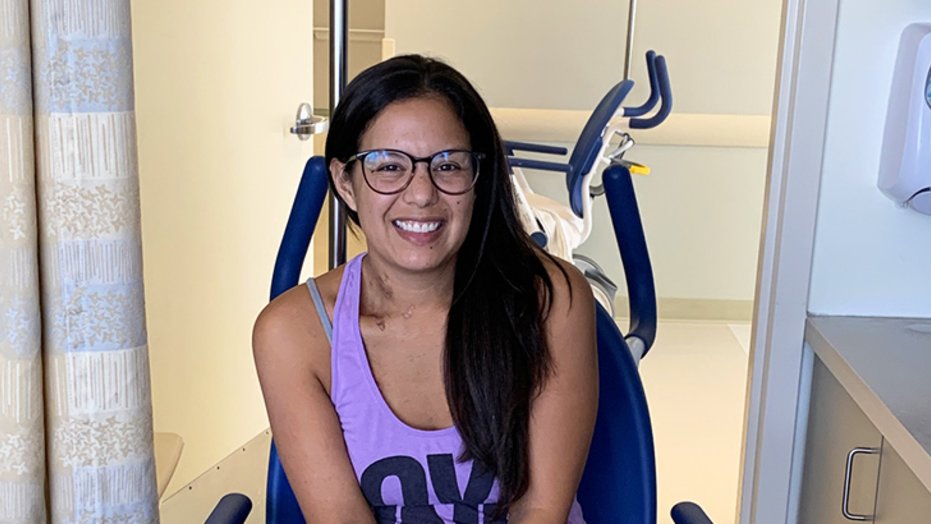
Dr. Maia Uli on the morning she left Sharp Memorial Hospital, 22 days after medics brought her to the emergency department with a mysterious illness.
She returned to her OBGYN clinic part time after two months and began studying for her medical board exams, which she passed in January 2020. She went back to work full time a few weeks later, her heart fully recovered. Recent tests confirmed the tumor was not cancerous and has not spread.
Though the ordeal was terrifying, Dr. Uli says the compassion of her Sharp Memorial medical team and Sharp Rees-Stealy colleagues will remain with her. From her primary care physician
Dr. Pany Robinson, who fed her ice chips one by one in the intensive care unit, to the health care assistant who helped wash her hair in a bucket when she couldn't shower, each caregiver showed an unparalleled level of kindness to her and her husband.
Mostly, Dr. Uli is just indescribably grateful — not only to be alive, but also to return to work as an OBGYN, a career she knew she wanted to pursue when she was 5 years old. While in the hospital, doctors weren't sure whether her medical crisis would damage her cognitive and neurological function, or her surgical skills. It didn't.
"Her identity is as a doctor, and I don't know what would've happened if that were taken away from her," says her husband, Jess Bradshaw. "Being in scrubs, walking through the hospital, caring for her patients — this is who she is."
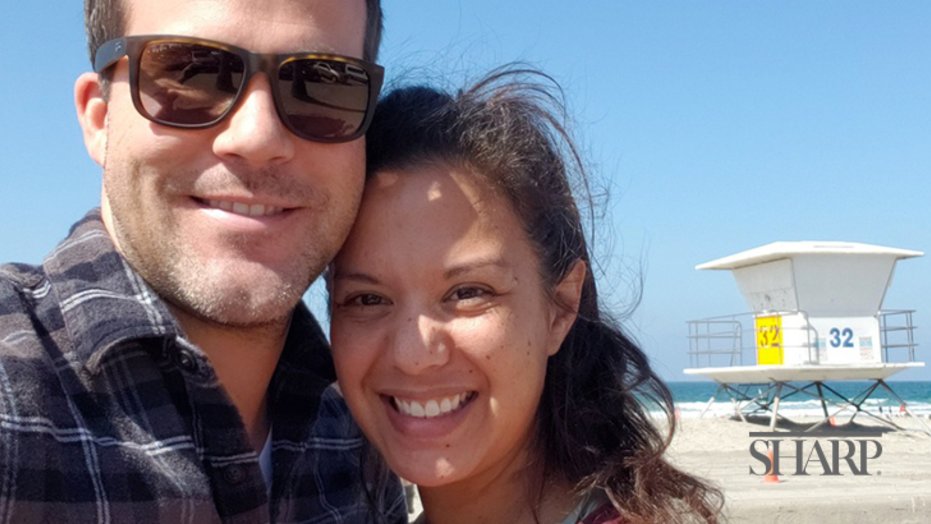
Dr. Maia Uli and her husband, Jess Bradshaw, enjoy a trip to the beach following one of Dr. Uli’s physical therapy appointments.
For the news media: To talk with Dr. Maia Uli or her Sharp Memorial Hospital medical team for an upcoming story, contact Erica Carlson, senior public relations specialist, at
erica.carlson@sharp.com.
Our weekly email brings you the latest health tips, recipes and stories.